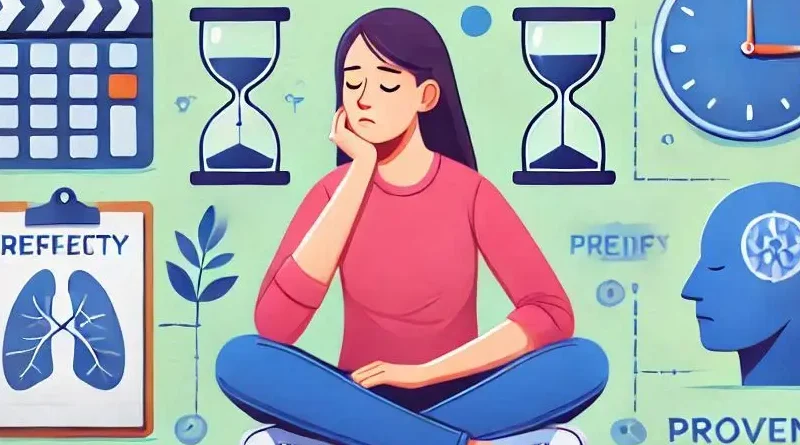
Proven Ways to Reduce Stress and Manage Anxiety
Introduction: In the heart of a bustling city, there lived a young professional named Alex. Alex’s life was a whirlwind of meetings, deadlines, and endless to-do lists. One day, Alex realized that the constant stress and anxiety were taking a toll on their well-being. Determined to find a solution, Alex embarked on a journey to discover proven ways to reduce stress and manage anxiety. Here is Alex’s story and the valuable lessons learned along the way.
1. Practice Mindfulness: Alex began by incorporating mindfulness into their daily routine. Each morning, Alex spent a few minutes meditating, focusing on their breath and letting go of any worries. This practice helped Alex stay grounded and present throughout the day. Mindfulness became a powerful tool for stress management.
2. Stay Active: Physical activity played a crucial role in reducing stress and managing anxiety. Alex started jogging in the park every evening. The fresh air and rhythmic movement helped clear their mind and release tension. Regular exercise became a cornerstone of Alex’s stress management routine.
3. Prioritize Sleep: Alex realized that lack of sleep was contributing to their stress and anxiety. They made it a priority to get 7-9 hours of quality sleep each night. By establishing a relaxing bedtime routine and avoiding screens before bed, Alex improved their sleep quality and felt more refreshed each morning.
4. Connect with Loved Ones: Social connections were essential for Alex’s well-being. They made time to connect with friends and family, whether through a phone call, video chat, or in-person visit. Sharing thoughts and feelings with loved ones provided emotional support and helped reduce stress.
5. Practice Deep Breathing: Whenever Alex felt overwhelmed, they practiced deep breathing exercises. Taking slow, deep breaths helped calm their nervous system and reduce anxiety. This simple yet effective technique became a go-to strategy for managing stress in the moment.
6. Set Boundaries: Alex learned the importance of setting boundaries to protect their time and energy. They started saying no to commitments that didn’t align with their priorities. By setting clear boundaries, Alex reduced their workload and created more time for self-care.
7. Engage in Hobbies: Pursuing hobbies brought joy and relaxation into Alex’s life. Whether it was painting, gardening, or playing a musical instrument, engaging in activities they loved helped Alex unwind and recharge. Hobbies became a vital part of their stress management plan.
8. Seek Professional Help: Alex understood that seeking professional help was a crucial step in managing anxiety. They consulted a therapist who provided valuable guidance and coping strategies. Therapy sessions helped Alex gain a deeper understanding of their stressors and develop effective ways to manage them.
9. Practice Gratitude: Alex made it a habit to practice gratitude daily. Each evening, they wrote down three things they were thankful for. This practice shifted Alex’s focus from stressors to positive aspects of their life, fostering a sense of contentment and reducing anxiety.

10. Stay Organized: Keeping an organized schedule helped Alex manage their tasks more efficiently. They used a planner to prioritize tasks and set realistic goals. By staying organized, Alex reduced the feeling of being overwhelmed and gained a sense of control over their day.
11. Limit Caffeine and Alcohol: Alex noticed that caffeine and alcohol exacerbated their anxiety. They decided to limit their intake of these substances and opted for healthier alternatives like herbal tea and water. This change had a positive impact on their stress levels.
12. Practice Yoga: Alex discovered the benefits of yoga for both the mind and body. Incorporating yoga into their routine helped Alex relax, improve flexibility, and reduce stress. The combination of physical movement and mindfulness made yoga a powerful stress management tool.
13. Listen to Music: Music became a source of comfort for Alex. They created playlists of their favorite calming tunes and listened to them whenever they felt stressed. Music had a soothing effect and helped Alex unwind after a long day.
14. Spend Time in Nature: Alex found solace in nature. They made it a point to spend time outdoors, whether it was a walk in the park or a weekend hike. Being in nature helped Alex feel more connected and at peace.
15. Practice Positive Self-Talk: Alex learned to replace negative thoughts with positive affirmations. Practicing positive self-talk boosted their confidence and helped them manage anxiety more effectively. This shift in mindset made a significant difference in their overall well-being.
16. Limit Screen Time: Alex realized that excessive screen time contributed to their stress. They set boundaries for their use of electronic devices, especially before bedtime. Limiting screen time helped Alex relax and improved their sleep quality.

17. Stay Hydrated: Drinking enough water became a priority for Alex. Staying hydrated helped them feel more energized and focused throughout the day. Proper hydration also played a role in reducing stress and maintaining overall health.
18. Practice Journaling: Journaling became a therapeutic outlet for Alex. They wrote down their thoughts, feelings, and experiences, which helped them process emotions and gain clarity. Journaling provided a sense of relief and helped Alex manage stress.
19. Laugh Often: Laughter became a natural stress reliever for Alex. They watched funny movies, read humorous books, and spent time with friends who made them laugh. Laughter lifted their spirits and reduced anxiety.
20. Volunteer: Giving back to the community brought a sense of fulfillment to Alex’s life. Volunteering allowed them to focus on helping others, which in turn reduced their own stress. The act of kindness and connection with others made a positive impact on their well-being.
Conclusion: Alex’s journey towards stress management was filled with valuable lessons. By practicing mindfulness, staying active, prioritizing sleep, connecting with loved ones, practicing deep breathing, setting boundaries, engaging in hobbies, seeking professional help, practicing gratitude, staying organized, limiting caffeine and alcohol, practicing yoga, listening to music, spending time in nature, practicing positive self-talk, limiting screen time, staying hydrated, practicing journaling, laughing often, and volunteering, Alex discovered proven ways to reduce stress and manage anxiety. Remember, every small step counts towards a healthier, more balanced life. Happy stress management!
And so, Alex’s story reminds us that managing stress and anxiety is a journey worth taking. With determination and the right approach, anyone can find effective ways to reduce stress and live a more peaceful life.







Pingback: Unlock the Secret to a Perfect Me-Time - storiesbay
Real wonderful info can be found on blog. “Prayer is the wing wherewith the soul flies to heaven, and meditation the eye wherewith we see God.” by Ambrose of Milan.
You are my inspiration , I have few web logs and often run out from to brand.
Thanks
Just want to say your article is as amazing. The clearness in your post is just nice and i could assume you’re an expert on this subject. Well with your permission let me to grab your RSS feed to keep up to date with forthcoming post. Thanks a million and please keep up the rewarding work.
Is ok, just backlist my site!
add a link to my site in your website!